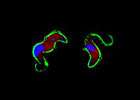Gene clue to drug resistance in African sleeping sickness

(Medical Xpress) -- Researchers have identified a gene that controls susceptibility to drug treatment in Trypanosoma brucei, the parasite responsible for African sleeping sickness.
Human African trypanosomiasis (HAT), also known as sleeping sickness, is a parasite disease that is transmitted by the tsetse fly and is usually fatal if left untreated. There is currently no vaccine, and chemotherapy is the only treatment option.
During the early stages of the disease, pentamidine is typically the only drug available. However, diagnosis is often late and in these cases the arsenic-based drug melarsoprol is often used, despite the fact that the therapy itself kills approximately 5 per cent of patients.
This desperate situation is made worse by the increasing incidence of melarsoprol resistance in up to 30 per cent of patients in some areas. Cross-resistance among the melarsoprol-pentamidine drug classes was reported more than 60 years ago, but understanding of the underlying mechanism remains incomplete.
Earlier this year, research led by a team at the London School of Hygiene and Tropical Medicine identified two parasite genes that are involved in the action of both pentamidine and melarsoprol. Both genes encode channels that can transport water and glycerol in or out of the parasite.
Now, the same team - in collaboration with the University of Glasgow - have shown that trypanosomes lacking just one of the genes, the AQP2 gene, were resistant to both drugs and that this gene alone could explain the previously observed drug resistance. They also found that the same gene was specifically disrupted in a drug-resistant strain generated in the laboratory several years previously. The findings suggest that AQP2 is required to enable the drugs to get into the parasite.
Dr David Horn from the London School of Hygiene and Tropical Medicine explains the importance of the findings: "Disrupting AQP2 is probably akin to turning off a tap, reducing the flow of drugs into the cell.
"One important question now is whether disruption of the AQP2 gene can explain cases of drug resistance in patients. If so, then we can look to develop a test based on this that could help to tackle drug resistance in the field when it arises."
More information: Baker N et al. Aquaglyceroporin 2 controls susceptibility to melarsoprol and pentamidine in African trypanosomes. Proc Natl Acad Sci 2012 (epub ahead of print).
















